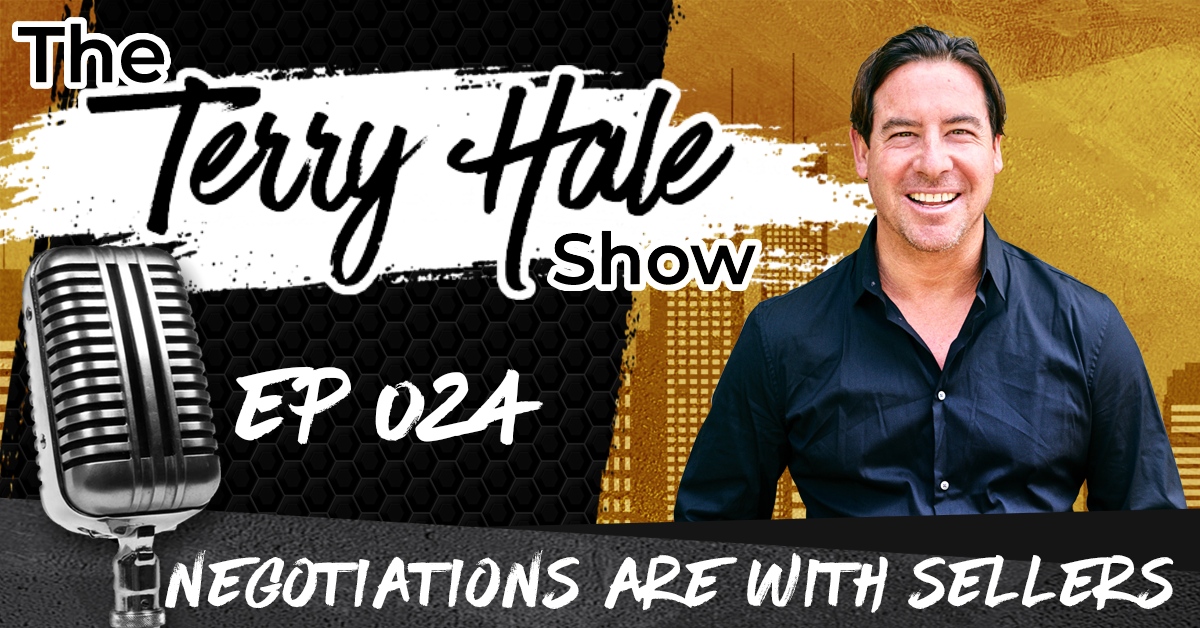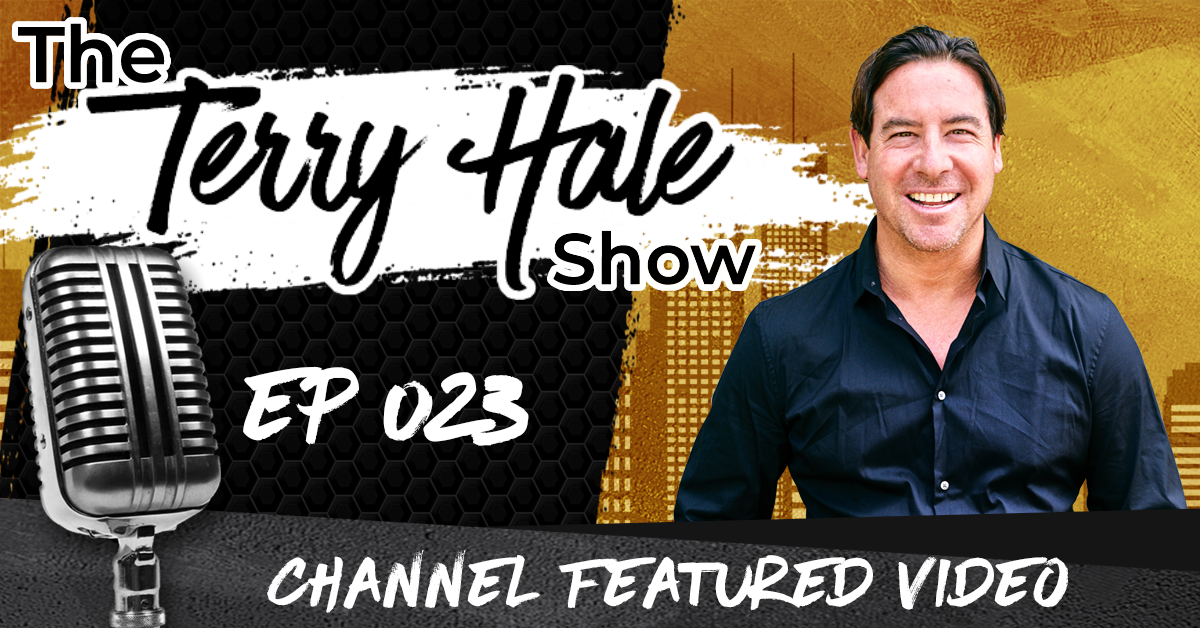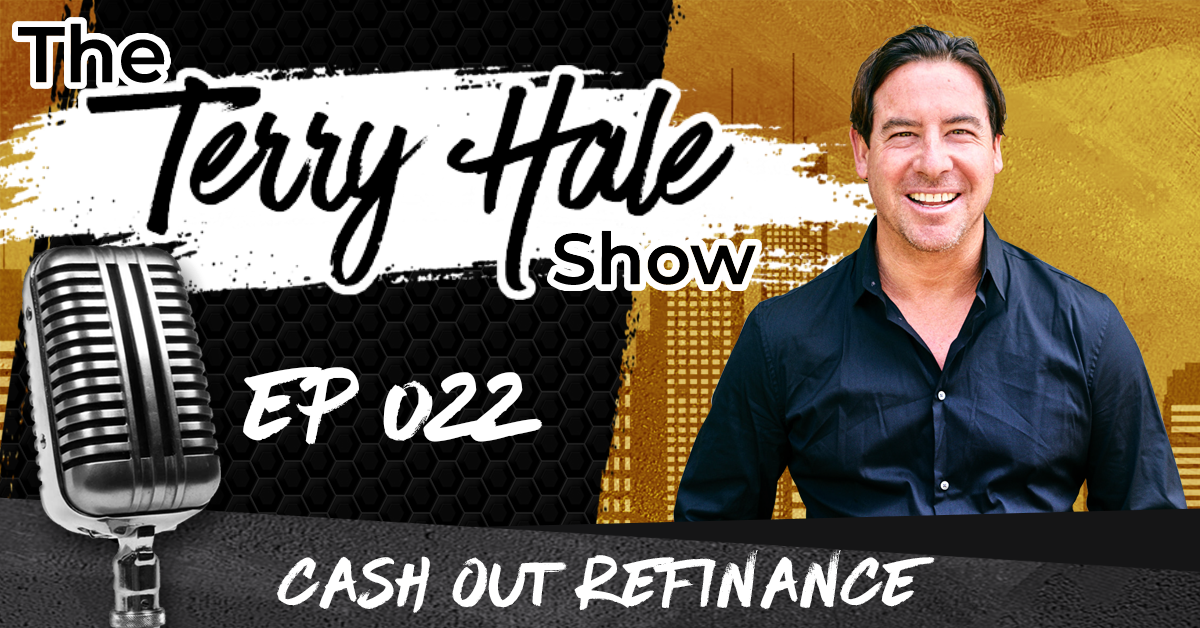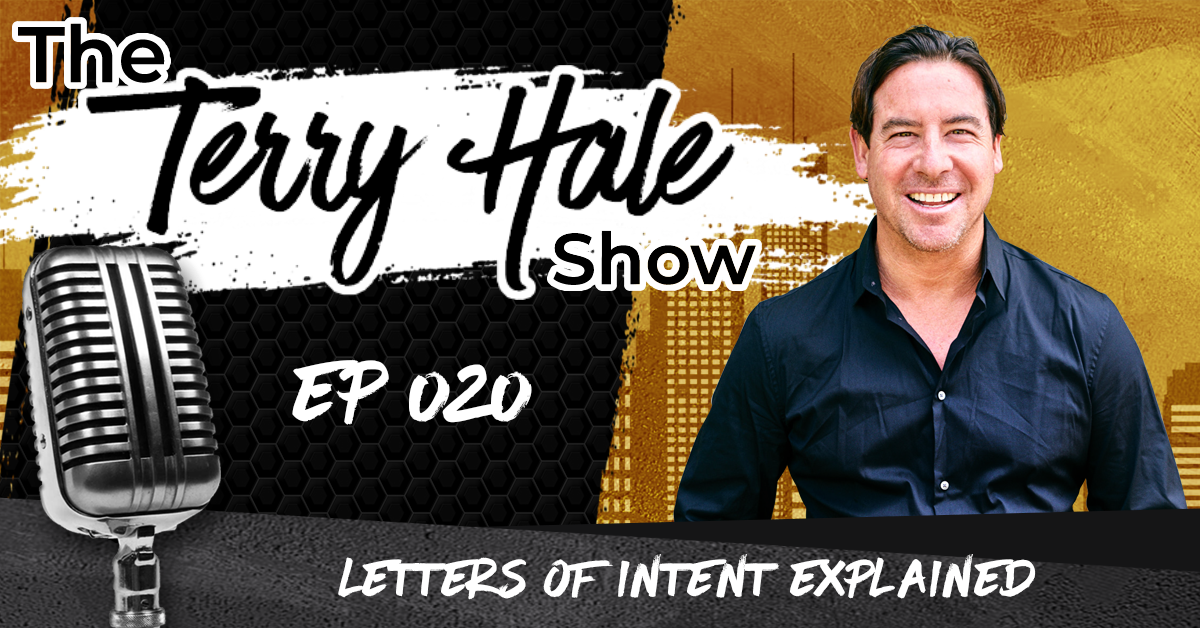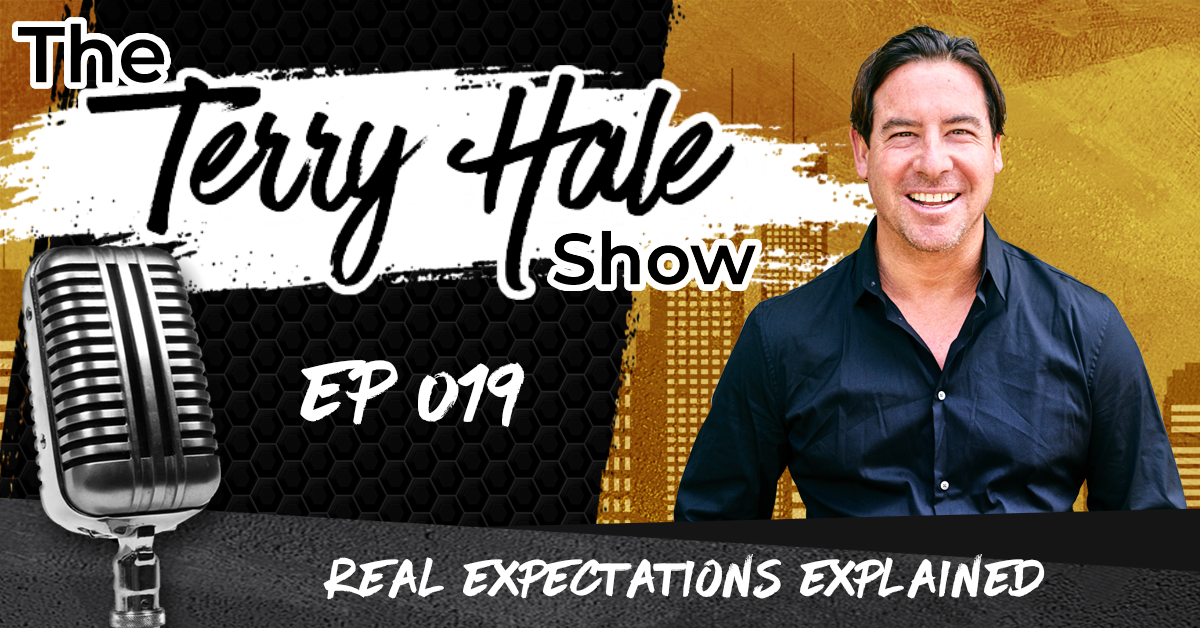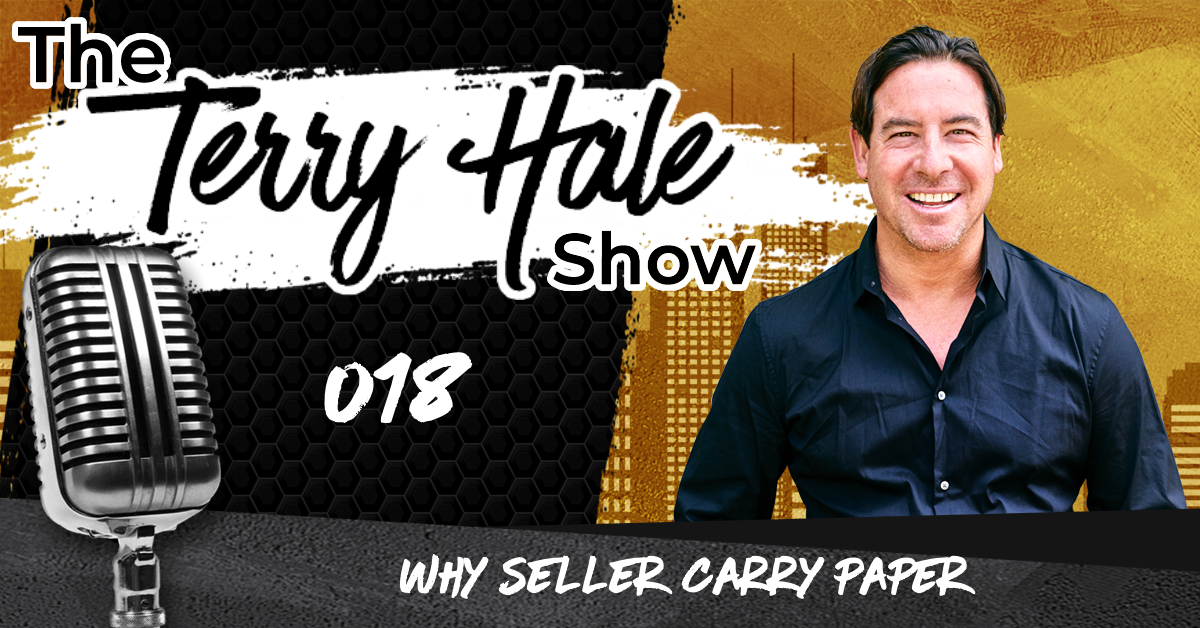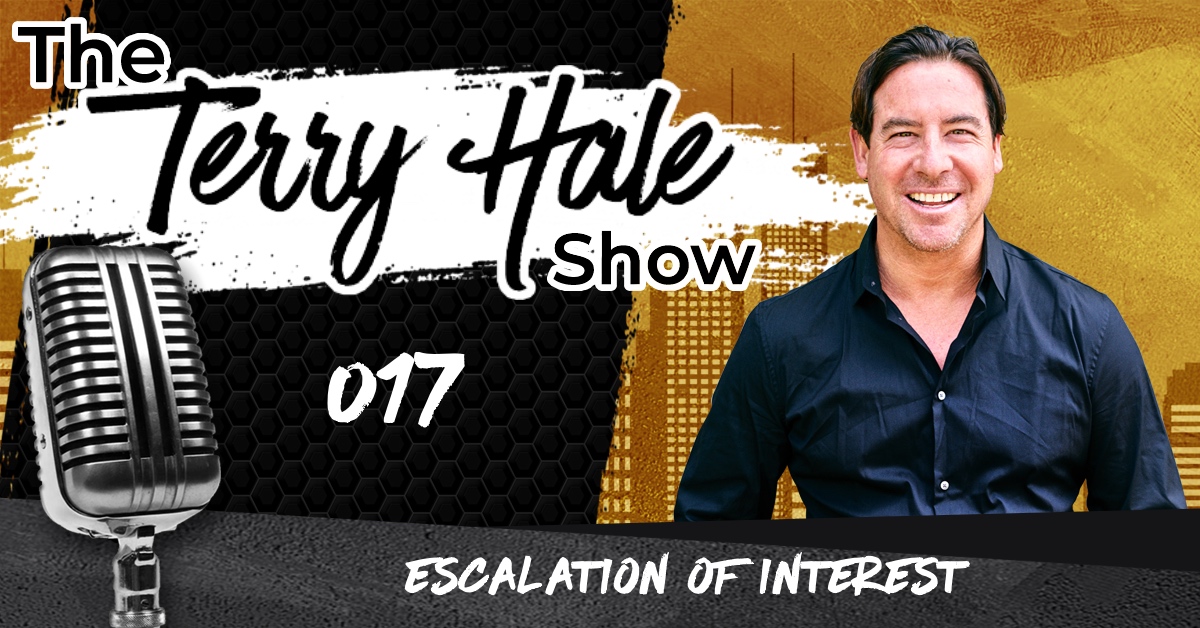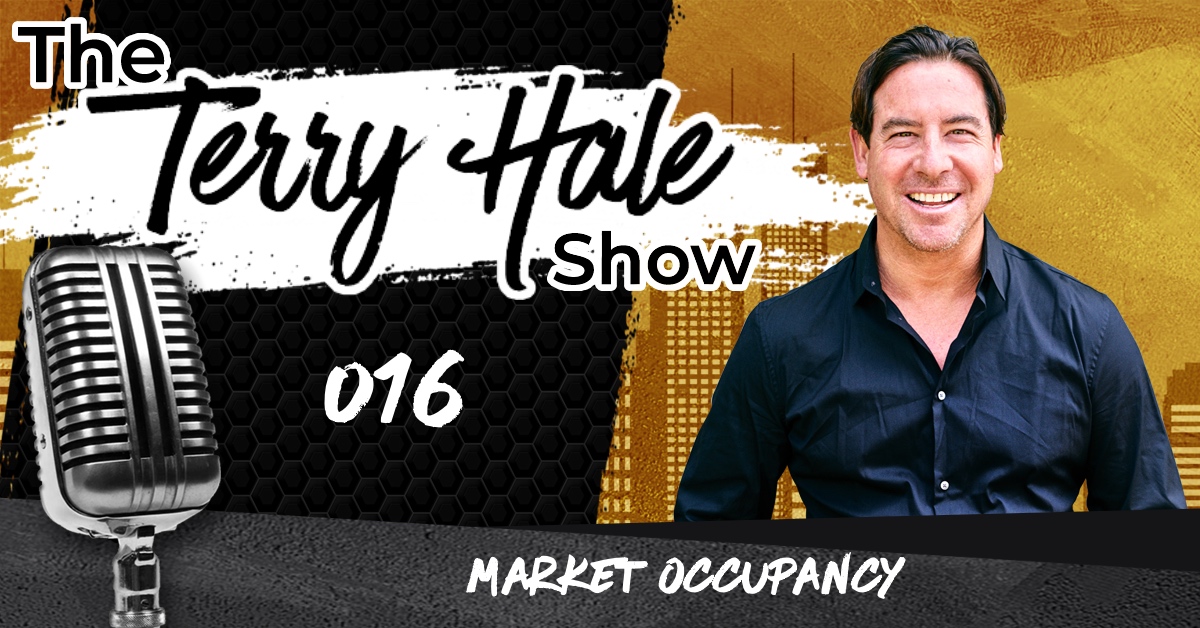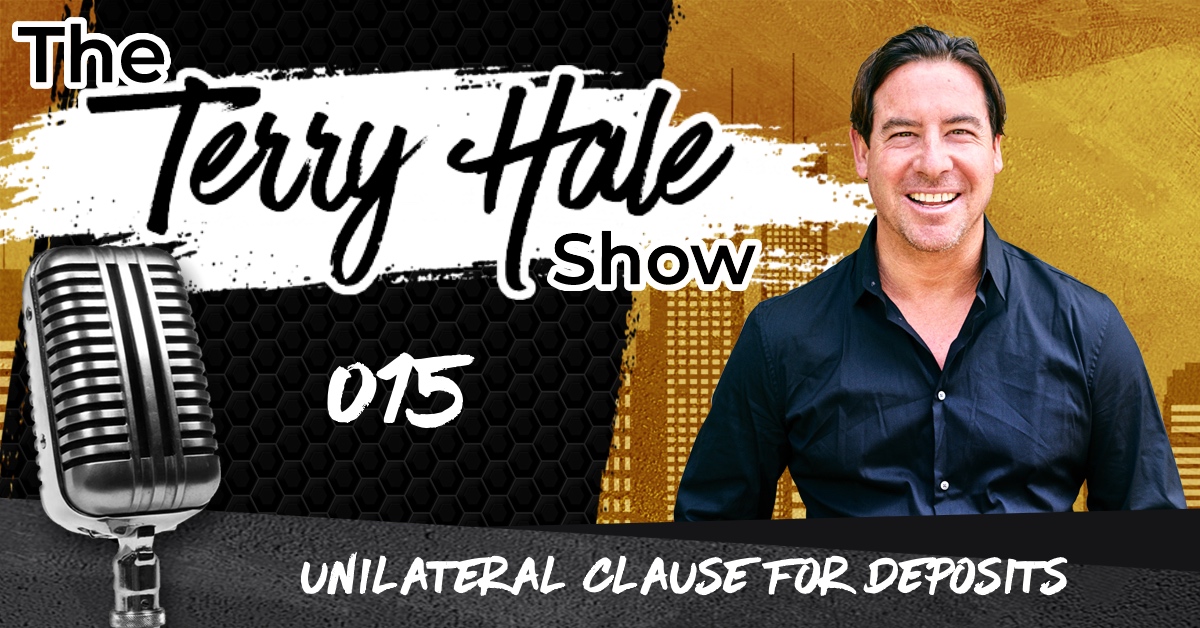Posts by Richard Matthews
The Terry Hale Show Episode 24
Negotiations are with Sellers
TRANSCRIPTION
Hey, guys! This is Terry Hale, just wanted to get a quick minute and just tell something
To you here because I just got off a call and it was with a broker. This guy’s name is Stu.
And Stu sat there and tried to negotiate the deal with me. And I told him I said,
“Stu, with all due respect, Sir, look, negotiations are not with brokers. They’re with sellers.”
And I want you guys to understand this, when you’re on the phone, although we love brokers,
We want to make sure that we’re doing business with brokers. It’s great to use brokers
In these transactions because they, first off, have a fiduciary duty to present all offers.
So we can make lowball offers. We can make offers that are creative with seller financing,
Great terms, lease options, all different types of ways to pursue these properties.
And get super creative. And remember the type of projects that we’re looking at –
Brokers, they’re super eager to sell because they’re not cash flowing at their highest and best use.
But just remember not to negotiate out there with these actual brokers, save it for the sellers.
Put yourself in a key position to warm up to the brokers let them know that
After you reposition the property, you’d love to give the business back to them
And have them service you and sell it at a better Cap Rate, meaning at its highest and best use.
So now they’re going to make money twice. They’re going to make money once,
When they sell it to you creatively. And then after you reposition it and you’re making all your money,
You give it back to them. They make you more money, but in turn, now they’re being fed.
And it’s a great way to dangle a carrot. Get brokers comfortable with you. Remember,
We respect these people, and they guard their time so don’t get frustrated
If they’re not giving you the time of day they guard their time from tire kickers.
So do yourself a favor, keep the negotiations for the sellers. I hope you enjoyed this segment.
If you dig it, great! Cick it. Click the link or just visit https://terryhale.com/
And I look forward to engaging with you guys real soon. Take care
The Terry Hale Show Episode 23
Channel Featured Video
TRANSCRIPTION
Hey, this is Terry Hale commercial real estate trainer. If you’re looking to make
Exceptional wealth, monthly passive income. You should really check out
My strategies and techniques. I have a new show here called
The Terry Hale Show, right here on YouTube. Why don’t you go ahead
And click the link and check it out. Go ahead and subscribe.
And I look forward to engaging with you here real soon. Take care.
The Terry Hale Show Episode 22
Cash Out Refinance
TRANSCRIPTION
Hey, this is Terry Hale, commercial real estate trainer wealth builder out here in beautiful
West Palm Beach just got through locking down yet another apartment building.
It’s kind of crazy, my social media platforms, people are saying things like
“Hey, where can you possibly find a seller that’s going to carry -? Do these really exist?
Or, “Yeah, sure. Show me.” And what they don’t understand, what they they fail to understand,
Also, is that we’re working with a different type of product. We’re not working
With property that is operating in it’s highest and best use. We’re not working with property
Where the sellers are jumping up and down because of the income that they’re receiving every month.
These properties are distressed, I mean, they’re not environmentally challenged.
These are not dilapidated. They’re not structurally-challenged, by any means.
They’re good looking property, typically, C and B Class. We rarely roll out on
A class property, that’s newly built in in super hot areas. These are B and C. This one’s a 50-unit,
In a great area right outside of West Palm Beach. And the backstory is that the seller
Has neglected the property, they basically take anyone that can fill out an application.
There’s no background check. So the tenants can be a little problematic,
Because they’re not bringing in quality tenants that pay their bills.
And the place needs a little bit of rehab, some fix up. And it is what it is the thing’s underperforming.
It doesn’t qualify for bank financing. So in that regard, there’s two ways to buy it two ways.
One way is an all cash. That’s a lowball offer. And the second way is to have the seller carry paper.
So it wasn’t advertised, it was offering seller financing. It was my strategy,
And part of my negotiation tactics to point out for mutual benefit, that the seller becomes the bank,
They carry the paper, we go in and fix the rehab issue. We fill it. Stabilize it with good strong
P and LS Profit Loss Statements. At that point, its operating in its highest and best use
And we pull a cash out refinance. We actually increase the value. We buy it down here,
We increase it to up here. And then, when we actually trigger a refinance, is a cash out.
So we actually get cash at closing with that cash at closing that goes into our pocket.
We don’t pay taxes on that money until we sell the project. And then we refi
It with low-interest permanent debt. And then, from that low interest permanent debt,
We carry it for cash flow, and that cash flow comes into our bank account, every single month.
Financial security creating generational wealth, and we never sell the property
So we’re not paying tax on that cash out. Now, if we do decide to sell the property,
We still don’t pay taxes on the cash out money. Because we’ll roll it into a 1031 exchange.
And that’s building wealth, taking it from a C class and moving it to a B class in a better area.
Something that’s got more meat on the bone. So I hope you dig this segment justifying
That there are deals out there. Again, I’m doing my final site visit on this one
And got a lot in the pipeline, I can show you how to do it. It’s just a matter of
Understanding the key identifiers and being open-minded and getting creative.
And that’s exactly how people are building exponential wealth and creating generational wealth.
Alright, so if you dig it, click the link below. I appreciate it. Or better yet,
Just go to https://terryhale.com/.
All right. Take care and talk to you real soon. Bye.
To learn more strategies and techniques, visit https://terryhale.com/ or go ahead
And click the link in this video description. And I look forward to engaging with you real soon.
The Terry Hale Show Episode 21
Cap Rate Formula
TRANSCRIPTION
Hey, this is Terry Hale give you a little wisdom for wealth here.
10 Cap properties, people say, “You can’t buy a 10 Cap.” All the time I hear this.
And what does Cap mean? Let me explain. cap is a capitalization rate. The way it works
Is you have all your gross income and you have your itemized expenses.
And then, once you minus out your expenses, you end up with your net, also known
As net operating income. And that NOI, the simple mathematical formula for this
Cap Rate is NOI divided by purchase price, which equals your capitalization rate.
Now, the cap rate can be a single digit or a double digit number. Always remember that
When you buy, you want to buy at a high cap rate. When you sell you want to sell at a low cap rate.
So, the lower the cap rate, the more retail the deal. That’s the way it works.
Sometimes people get that backwards. So what I do is I look for property, and I follow
A 10 Cap type of approach. And with the 10 Cap approach, if you buy on a 10 Cap,
You have an opportunity to purchase the property right, be able to get in there,
Raise rents, fill vacancies, add profit centers, do any capital improvements,
And you will come out with an amazing return on investment. And that’s what this is all about
Return on investment, I can show you exactly how to do it. And finding these 10 Cap properties.
People say it’s hard and you know what, if you’re looking at retail deals,
And you’re just scouring through websites like Loopnet, or CityFeet, or one of these
Websites that just has a bunch of retail property on it. Of course, it’s going to be difficult.
You’re looking for a needle in a haystack, right? I mean, you’re mining for diamonds.
But if you use some simple key identifiers, like days on market, or look at property that’s out there
That’s got a lot of vacancy, then maybe what they’re doing is they’re just on a fishing expedition.
Meaning that they’re just going to put something out there in the marketplace and see who bites.
Because something’s worth what someone’s willing to pay, right? And for that reason,
They’ll go ahead and test the water, throw a ridiculous number out there,
Which is called proforma that’s future value. We’re not talking about buying on proforma.
We talk about buy ads is whereas in its current state and its current condition,
And if you follow my rule of buying “as is,” and looking at value and place meaning huge upside.
Then, you can also justify seller financing. You can justify seller financing
Because the deal does not qualify for bank financing. If it’s gotten a lot of vacancy,
If the rents aren’t raised and it’s not at its highest and best use. So it’ll truly give you
An opportunity to create massive amounts of wealth, be able to create monthly passive income
For financial security. And I’d love to show you how to do it. If you liked this segment,
Go ahead and click the little link in the description
Or better yet just visit my website at https://terryhale.com/
https://terryhale.com/ and I look forward to engaging with you again real soon.
All right, take care.
To learn more strategies and techniques, visit https://terryhale.com/
Or go ahead and click the link in this video description.
And I look forward to engaging with you real soon.
The Terry Hale Show Episode 20
Letters of Intent Explained
TRANSCRIPTION
Hey, this is Terry Hale. Really good question, why do we use letters of intent?
In the residential house buying business, if you’re doing that,
You go out there and you find a project, and maybe it’s a distressed seller,
Or you can get it for the right price, maybe someone’s just super motivated to sell
Not so much distressed, whatever the case, right? What you do is you move it forward
And then you put it under contract. You put it under contract,
And then you can either wholesale it, you can get a transactional funding and close it.
Or you bring in your own capital, and then you close it, and then you rehab it,
And then you sell it. The level of insanity who that is,
You’re only as good as your next deal. And you keep doing it over and over again.
And it’s a quicker moving dynamic commercial takes a minute,
Because what you’re doing is you’re going back and forth.
You’re carving out the right details. You’re creating generational wealth and passive income.
So you want to make sure that you dial it in right.
You want to make sure that you can go back and forth and negotiate a little bit.
So the way we did, typically is we don’t go direct to contract, we slow it down.
We have a meeting of the minds. We find it. We pre screen it. We evaluate it.
We structure our terms in our head, what we want to do, and then comes the power of negotiation.
We jump on the phone. And we have a meeting of the minds with the seller, note, not the broker.
Negotiations are never made with brokers are always made with sellers,
Brokers are there to present offers. And so you know, all brokers, all agents,
They have a judiciary duty to present all offers. That’s why we’re able to make these low-ball offers,
And they still have to present them. But you have to make sure that you use some techniques
And dangle the carrot, make sure that you’re a relationship builder,
and you want to do more business with them to entice them to want to do business with you.
All right. But back to the letter of intent. The reason why we use it is because
It’s a meeting of the minds we have that negotiation, then we process that information
Onto a one-page LOI. LOI stands for Letter of Intent.
Then they have an opportunity to digest the letter of intent. Look it over, talk about it.
And then from there, if they want to do business with us, they sign the letter of intent
Or we go back and forth and tighten up the negotiation.
So Letters of Intent are extremely useful tools.
I’ve mastered the craft of putting those together so they produce results.
And I look forward to having you join my team, so I can give you a dozen of them.
All right. To learn more strategies and techniques, visit terryhale.com
Or go ahead and click the link in this video description.
And I look forward to engaging with you real soon.
The Terry Hale Show Episode 19
Real Expectations Explained
TRANSCRIPTION
Hey, this is Terry Hale, want to take a quick minute here,
I got off the phone with a client of mine. And we were talking about expectations,
Like what could they really expect as far as results because
I’m a very result-driven person. And so is my new client, Aaron.
So this is what went down, I told Aaron and I said,
“Look man, you just need to concentrate on the aspect of locating the right project.
Once you find the right deal, then you have to pre-screen it.
You got to go through the standard protocol to determine
If we can set up multiple exit strategies. Once that all happens, it takes about a week.
And then when you determine that it’s a real deal, we put it under contract.”
Typically, we go under contract within 10 days of an executed letter of intent.
And then from that letter of intent, we got a contract.
From contract we have anywhere from 30 to 90 day due diligence.
So as you can see, the timeline starts wrapping up, right?
It starts going up there. So 90 day due diligence max, typically, it’s 45 to 60.
And then we have time allocated for closing. So we can wrap it up
With a full seller finance note in as little as 10 days of closing.
Or, if we’re going to be bringing in additional private capital and doing a full takeout
To buy the low price point, then that could be around 30 days on closing.
So if you add up all those timelines, the realistic results that I told Aaron,
And then I’d like to share with you is, do a deal every hundred and eighty days.
That means two deals a year. That’s all you need to focus on.
And it only takes one to create yourself monthly passive income to set you up for life.
I mean, if you’re like a client of mine that just closed his project four weeks ago,
And when Terryn closes project, it went literally from day one to five weeks later.
Under contract moving it forward.
And now he’s got over $725,000 equity locked in the walls on that deal,
But he’s getting monthly passive income. And you can do this business,
You can set it up, just concentrate on two deals a year. I mean, one deal,
You can be one and done. But if you want to create a portfolio,
Continuously take the action, do two deals a year. All the rest of the time,
Spend time with your family, spend time with your friends.
Do what it is that makes you happy because life is so dang short.
You got to enjoy life and live life in abundance.
Commercial real estate allows you the benefit of, stop selling your time for money
And start concentrating on the good life. Go get a suntan.
Have a good time. That’s what it’s all about. To learn more strategies and techniques,
Visit terryhale.com or go ahead and click the link in this video description.
And I look forward to engaging with you real soon.
The Terry Hale Show Episode 18
Why Sellers Carry Paper
TRANSCRIPTION
It’s Terry Hale. I want to take a quick second to talk with you about
seller financing and why sellers would ever even think about
offering such amazing terms, just to give you a handful of
some terms that have been cut within the last 30 days,
on deals, projects that are under contract moving forward,
we have a 54-unit apartment complex that is under contract,
we have a 10-year seller finance note, that was a structure at 6% interest.
It’s not as low as I wanted, but it’s not a bad interest rate,
no personal credit check, we have 110 unit apartment,
that’s a really great deal out in Tennessee market,
that project actually has a 15-year seller finance note
with a lower interest at 5.5% interest.
And that’s actually an escalation of interest clause,
where it actually goes up over time, every five years,
it actually goes up a point.
So we want to get that one done sooner than later.
Got a couple of self-storage facilities also that are under contract.
And those also have seller financed structures.
And the key here, guys, is when you’re moving on the seller finance deals,
you’ve got to make sure that you’re talking to motivated sellers.
We’re not dealing with brokers, guys, when we’re negotiating deals,
you probably heard me say that in a previous segment,
we’re not dealing with brokers,
brokers are there to help service the project and sell it
and give us the knowledge that we need. So we can move it forward,
the negotiations are actually made with the seller.
So when we’re actually structuring these seller finance notes,
you got to look at the project
if the project is not going to warrant seller financing,
meaning it’s not justifiable, and there isn’t a mutual benefit there.
You gotta sit yourself within reason,
Hey, I’m trying to mold something trying to turn a turkey into an eagle.
It’s never going to fly. We’re making lemonade from lemons, as they say.
And for that reason, we have to have
the key identifiers in place like low rents,
we have to have a lot of vacancies, we have to have motivated sellers,
we’re dealing with a lot of inheritance property right now.
And these types of properties are out there,
there’s an abundance of these properties in your own backyard.
A lot of times they’re not even advertising,
that they’re willing to carry paper.
That’s your job guys. It’s something where you get the knowledge for me,
I’ll show you how to do it.
And then we position these deals through negotiations.
And we justify that and we point out that, hey, we can buy it all cash,
we just closed a deal in Kissimmee, Florida,
we bought it all cash for 500,000 and change.
And they were advertising it at 1.1 million.
And then we tried to get seller financing at around an $800,000 number
they wanted the all-cash so they took the all-cash not a problem. You know,
so that’s it, that’s the way it works, seller financing,
they’re going to make more money than an all-cash deal.
And they carry paper and they become the bank.
And, you know, the alternative to that guys is that they’re going to be
sitting on the property if no one’s willing to pay all cash.
And if they’re not willing to get creative, it’s not bankable,
it doesn’t qualify for institutional financing hard money
or even private capital.
These deals just sit and there’s a lot of them just sitting so I can show you
how to find them pre-screen them evaluate their structure and negotiate
and facilitate them with the team.
Grab the knowledge guys this is the time.
The time is now. Make it happen. If you like this tip,
seller financing is available on projects that make sense.
Go ahead and click the link below in the description of this video.
Or better yet, just go to terryhale.com and I look forward
to engaging with you again here real soon.
The Terry Hale Show Episode 17
Escalation of Interest
TRANSCRIPTION
Hey, this is Terry Hale, commercial real estate trainer.
Why don’t we just shoot a quick little video for you.
In regards to an interesting conversation that I had today,
I negotiated a project that is 110 unit apartment,
and we ended up getting a really great deal.
We ended up locking it down for 2.150,
the original asking price was north of that closer to 2.9.
So we got a huge discount, we got great terms,
we ended up getting a 10-year seller finance note;
non-recourse, which means no personal guarantee,
they’re not going to ask for a credit,
they’re not going to ask us for tax returns or
bank statements, anything like that.
And we ended up getting an attractive interest.
It was what I refer to as “Escalation of Interest.
So how do we get 10 years on a seller Finance?
No, because 10 years obviously sounds like you know,
a long time for for a seller to carry paper, right?
Typically, short-term is 24… maybe 36 months.
So this one we did, it was an escalation of interest.
So we ended up starting off with low interest,
just a couple points above prime.
So we’re at about five and a quarter percent interest.
That does escalate after the third year,
it goes up a point two, six,
and then for each year thereafter,
it goes up a half a point.
The reason why we did that escalation of interest is because
when people are actually as I call it being
“bean counters” right there,
they’re counting numbers, they’re looking at
what their return on their investment is
or what the return on their loan,
if they’re gonna be lending money.
In this case, it was a seller finance note, right?
But what was great was the seller saw how much money
they’re going to be making in interest because we scheduled
half of that time period of the 10 years,
the first five years is interest-only.
So they’re going to get five years of additional interest.
And then, of course, it falls over to
a 30-year amortization schedule.
And that’s going to be for the remaining five years.
So they’re even getting a little bit interest off of that too.
When you’re playing as I call “Play the Greed”.
When you’re playing the greed
of someone who’s counting beans,
and looking at what they’re going to be making overall,
over a period of time,
it’s advantageous for them to carry long term.
I’ve done some amazing strategies
using escalation of interest
where I’ve had sellers carry up to 29 years
as a 29-year seller finance note.
For that, they typically need
to own the property free and clear.
This one, the note actually happens to balloon in 15.
So he felt comfortable going 10. So escalation of interest,
playing on their greed to get
a longer-term seller finance note,
pretty awesome and great deal.
My clients are super happy.
Sean couldn’t be any happier.
We’re off to the races on this one.
It’s coming to fruition,
and I look forward to sharing it
with you again in the future.
Hope you liked the tip.
Go ahead and click the link in the description
or just visit TerryHale.com
and I look forward to engaging again
with you here real soon. All right? Take care.
The Terry Hale Show Episode 16
Market Occupancy
TRANSCRIPTION
Hey! Terry Hale here at a 24-unit apartment,
a recently closed project.
And I just want to take a minute here and give you a quick tip
about market occupancy and what you can expect.
So anytime that you’re going to be doing any rehab
and this may sound simple if you’re a house flipper
and you’ve been doing rehabs.
But the last thing you want to do is over-improve the property.
Just bring it back to the current state that it was
at the last time that it was rented.
Another key thing is to look exactly when is the last time
that it was at market occupancy.
Regardless if it’s a 24-unit apartment like this,
or 100-plus-unit or, you know,
hundreds of units on the Self Storage,
it doesn’t matter, we always want to find out exactly
what current market occupancy is.
What we use as a rule of thumb is 85% across the nation.
So, regardless of where you happen to be in the US,
85% is market occupancy. So you have 100 units,
85 of those should be rented typically
a 10% vacancy factor, right?
If you’re at a super hot market or dealing with a smaller project
like this 24-unit, even though this one will be yielding over
$12,000 a month when it’s all said and done.
And that’s not bad money to make, man.
That’s the cash flow, right? It’s cash flow every single month,
netting 12-G’s-plus, in your pocket every single month.
Not a bad deal. This one was a diamond in the rough
and we got seller financing, seven-year deal,
starting out at 6% interest
and not a bad structure at all,
a lot of money to be made in the project.
And I’m super excited about it. So it’s my client, Claudia.
But here’s a fact, you need to understand that
if you’re going to be working with larger projects,
I typically use anything that is over 40 units,
use that market occupancy factor of
85% if you’re below 40 units,
you should be out there kicking some ass
filling those units marketing,
management, proper collections, tightening it up,
running it as a business and not landlording personally.
We’re not buying property down the street from our house,
we can go water the lawn and change light bulbs.
That’s not what we’re doing folks. We hire the professionals,
we let them do what they do best. We focus on what we do best,
but the market occupancy rule of thumb for this tip is 85%
of the larger and anything below 40 units you can get it to 100%
I know you can,
especially if you do business with me
we’ll be ramping up and getting the thing 100% occupied
and reap the benefits of the cash flow.
All right? Cool!
Well, happy investing out there!
If you liked this tip, go ahead
and click the link in the description.
Or better yet, come and see me at TerryHale.com
and I look forward to engaging back with you here
real soon. All right? Take care.
The Terry Hale ShowEpisode 15
Unilateral Clause for Deposits
TRANSCRIPTION
Hey, this is Terry Hale, doing this quick video.
I was speaking with a client of mine
that was getting ready to send in a deposit.
They asked me if it was okay to push that forward,
I told them about a cause that I wanted him
to insert in the actual contract
because it was so important. And that clause will save us
from having to chase down the seller
in the event that we cancel the deal.
Deals get canceled sometimes.
When they don’t come to fruition,
we want to make sure that we’re in a position
to stay in control of our money.
So the way it works is we put down
this simple deposit that ties up the property,
then we offset that deposit which is applied
to the purchase price at closing
along with the remaining amount for our down payment.
So don’t consent, don’t confuse down payment
with the deposit, right.
Deposit just ties up the property.
So this deposit amount was five grand,
not a lot of money, just $5,000 for tying up the property.
It’s an apartment building – 54-unit. It’s in the Memphis area.
Great upside, at least seven figures in the deal
takes a little bit of money to rehab, estimated 180,000 in expense,
not a huge purchase. But definitely a seven figure deal
So, huge ROI – return on investment. But that deposit amount,
and here’s the takeaway and the tip that I want to give you,
I had my client insert something called a unilateral clause,
meaning that we get our money back.
Regardless, it just takes our signature.
That’s the universal unilateral clause.
And it does not require the seller to give our actual,
his signature to get our deposit back.
So, if you’re going to be writing these Letters of Intent (LOI),
or if you’re going to be using my copies of LOI’s,
you’ll actually see the verbage in there for the unilateral clause,
but I wanted to tell you about it
because it’s so important to make sure
that you protect your money. Even if it’s just five grand.
You want to make sure that you get that money back
with no complication in case you decide that the deal
is not the right deal for you. But there’s plenty of projects out there
in commercial real estate that can produce
massive amounts of wealth.
And I hope you enjoyed the tip.
I look forward to engaging with you here real soon.
Please go ahead and click the link in this description on this video.
Or better yet, just go to TerryHale.com to learn more
and I look forward to engaging with you real soon.
Take care
